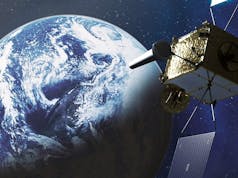New government funding for innovative solutions to tackle the growing problem of potentially hazardous space debris has been announced today by the UK Space Agency.
There are an estimated 900,000 pieces of space debris larger than 1cm orbiting the Earth, with only a small proportion of them tracked.
The UK Space Agency say it is providing up to £1 million for organisations to come up with smart solutions to this problem by using cost-effective ways to monitor objects in low Earth Orbit, or applying artificial intelligence to make better use of existing orbital data.
“Tracking debris allows satellite operators to predict possible collisions so that they can manoeuvre them out of harm’s way. One collision could create thousands of small, fast-moving fragments which can damage the satellites that provide everyday services such as communications, weather forecasting or satellite navigation.”
Science Minister, Amanda Solloway, said:
“From artificial intelligence to advanced tracking systems, the UK space industry is leading the way in developing ground-breaking solutions to worldwide problems. Today’s funding will enable businesses to develop cutting-edge innovations to combat the growing amount of space debris orbiting the Earth – helping protect vital services like communications, weather forecasting and satellite navigation.”
The UK Government say it is committed to the international effort to clean up space debris as the largest investor in space safety for the European Space Agency, including a substantial £10m commitment to the ADRIOS (Active Debris Removal/In orbit servicing) programme. Later this year, Harwell, Oxfordshire, will host the operations centre for the ELSA-d satellite clean-up and decommissioning programme led by Astroscale.
Dr Alice Bunn, International Director, UK Space Agency, said:
“We want the UK to be at the forefront of a new era of space where we continue to push boundaries while ensuring the growth is sustainable for all. Space debris is a global problem and this funding will enable UK companies to develop new methods to help tackle the issue. Growing our space surve
Organisations will be able to bid for a maximum grant award of £250,000, out of a £1 million funding pot. Space











Here’s a role for the U K post Brexit and something we are good at. Cleaning up, and I mean it seriously.A progamme of cleaning near space certainly but also the oceans. For the latter Use some of the overseas aid budget for the ships and crews to clean up the seas. What a contribution to the world that would be.
Yeah, how about a solar powered fully automated space debris collector that roams around and collects the debris then once full it sends it back to earth to burn up in a container of some kind.
I was thinking more along the lines of a Dyson Centennial Falcon with Hans Clean and Duke Seawalker.
Sounds good lol
I like your plan for cleaning the seas mate, could even use it as a multi national ‘task force’ going beyond traditional allegiances.
Something like Spaceball One?
https://encrypted-tbn0.gstatic.com/images?q=tbn:ANd9GcQM_gDQjn8KuehnIO0-ojLC8s56fFbLrVSasZkSTpDqrqeim1xd&usqp=CAU
There was a proposal to mount a laser on the ISS to deal with small space junk no bigger than a few cm. They were going to use a sensor from an abandoned military project, to spot tiny objects & target the laser on to them. The laser would cause a spot on the object to flare, acting a bit like a retro rocket, so the object lost speed & fell back into the atmosphere where it would burn up.
Am I the only one having visions of Doctor Evil and giant frickin’ lasers ?
Mwahhahaha